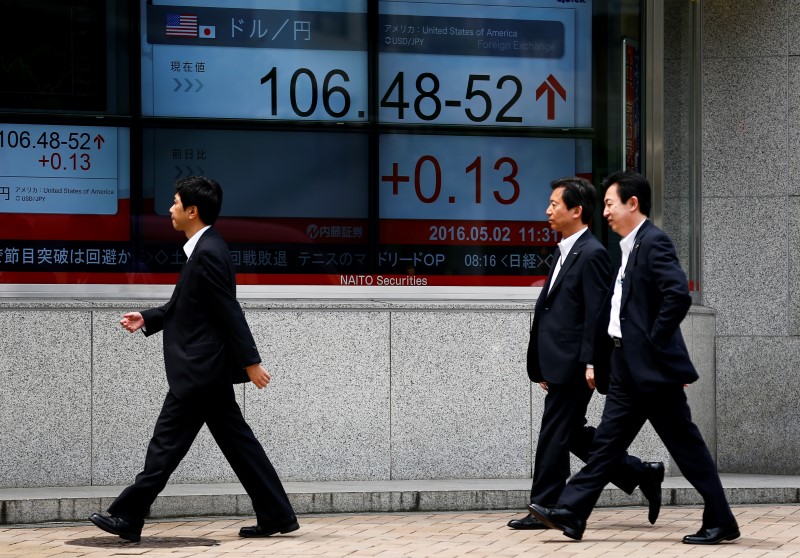By Wayne Cole
SYDNEY (Reuters) - Asian shares skidded on Wednesday as investors fretted about weak global growth and creeping deflation, undermining commodities and boosting demand for safe-haven sovereign debt.
European stocks were expected to follow Asia lower, with futures on Britain's FTSE (FFIc1) marked down 0.2 percent. Spreadbetters at IG expected Germany's DAX (GDAXI) and France's CAC (FCHI) to open down by 0.1 to 0.2 percent.
Disappointing manufacturing surveys from China and the UK combined with downgrades to growth and inflation forecasts from the European Commission to sour the mood.
Indeed, April factory data across Asia has disappointed in the past few days.
"After a bit of lift in March, which raised hopes for a sustained acceleration in activity, momentum again turned last month," said Frederic Neumann, co-head of Asian economics research at HSBC.
"Asia's big markets continue to disappoint: Japan sank further, China relapsed, and India slipped."
Equities were cold-shouldered in the rush to safe-haven assets and MSCI's broadest index of Asia-Pacific shares outside Japan (MIAPJ0000PUS) dropped 1.1 percent.
Tuesday's rate cut from the Reserve Bank of Australia (RBA), the first in a year, further underlined how the danger of deflation was spreading worldwide.
"Global yields fell sharply after the RBA cut gave a low inflation signal to markets," said analysts at Australia and New Zealand bank in a note.
"Concerns include a weaker company earnings outlook for banks, utilities, and commodity-producing companies. Sluggish economic growth remains a concern too, with many central banks reaching the limits of what can be done."
In Europe, yields on German government debt recorded their biggest daily fall so far this year, with 10-year paper down 8 basis points to just below 0.20 percent
Yields on U.S. 10-year Treasury notes (US10YT=RR) fell 7 basis points to a two-week trough of 1.798 percent. They had been as high as 1.94 percent last week.
DOLLAR PARES LOSSES
On Wall Street, the Dow (DJI) had ended Tuesday down 0.78 percent, while the S&P 500 (SPX) lost 0.87 percent and the Nasdaq (IXIC) 1.13 percent.
Even a surprisingly upbeat report on U.S auto sales failed to lift the mood, with shares of car makers falling on worries the industry's recovery was running out of steam.
The flight from risk also played out in forex markets with investors favouring currencies from economies with large current account surpluses such as Japan and the euro zone.
The yen did run into profit-taking on Wednesday, which dragged it back to 107.11 per dollar from an 18-month peak of 105.55
The euro also faded a bit to $1.1485
The U.S. dollar fared better against commodity-linked currencies, with the Australian dollar taking a particularly hard hit after the cut in domestic interest rates.
The Aussie was down at $0.7490
All the talk of deflation weighed on commodity markets, where gold, copper and iron ore all lost ground.
Oil prices wavered ahead of a U.S. government report due on Wednesday likely to cite record high crude stockpiles.
Brent crude (LCOc1) inched up 10 cents to $45.07 a barrel after two sessions of losses, while U.S. crude (CLc1) added 14 cents to $43.79.
